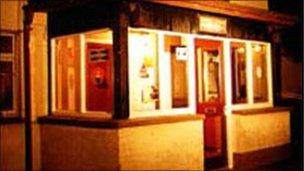Loughinisland massacre 'witness' criticises RUC
- Published

Six men were shot dead in The Heights bar in 1994
A woman has criticised the RUC for failing to act on information she said she gave about the 1994 Loughinisland massacre.
The witness said she gave a detailed description of the getaway car driver within a few hours of the attack, but it was never acted upon.
The PSNI said because an investigation into the attack was ongoing, it would be inappropriate for them to comment.
The Police Ombudsman is investigating the RUC handling of the massacre.
Six men were shot dead in the UVF gun attack on the Heights Bar in 1994.
One of the victims, Barney Green, 87, was one of the oldest people to be murdered during the Troubles.
The others who died were Adrian Rogan, 34; Daniel McCreanor, 59; Eamon Byrne, 39; his brother-in-law Patrick O'Hare, 35, and 53-year-old Malcolm Jenkinson.
Five people were also injured in the attack by gunmen armed with an AK47 and a Czech-made rifle.
No one has been convicted over the killings.
Investigative journalist Barry McCaffrey, who broke the story on The Detail website, spoke to the BBC about the case.
He said the witness, who does not want to be named, was standing in her driveway waiting for a doctor to come to her home when she saw what she later came to believe was a getaway vehicle used in the attack.
"It was a quiet rural country lane, the getaway car came speeding past with the interior lights on in the car," he said.
"When she phoned the police she was the first person to identify the make and registration of the car, so that's how she's so sure and police took her statement."
According to Mr McCaffrey, the witness claimed that was the last time she heard from police about the incident until 10 years later.
"She hadn't heard from police and she was expecting police to name the road she lived on for other potential witnesses to come forward and she was amazed that this never happened.
'Let down'
"She waited for days and weeks and years and the police never came back to her."
The witness and her husband later became friendly with a police officer who stored vehicles which were being held by police as evidence in various investigations.
"She was out with her husband at the police officer's home where he stored cars for the police.
"She was walking around the police officer's yard and out of nosiness as she said herself, she lifted a tarpaulin and amazingly came across what she believes was the getaway car."
The car was destroyed by police two years after the murder.
When the witness approached the police officer about the car she said the officer pointed to another vehicle and told her that car was also thought to have been used in the attack.
The journalist said the witness felt very angry and let down.
"She can't understand why, when she gave police the description on the night of the murder, why the police never came back to her and she can't understand why she was willing to go forward and help police whatever way she could and nothing ever happened," he said.
Mr McCaffrey said that the witness had also discovered that the description she had given police of the getaway driver and the car was missing from a copy of her original statement.
"When the ombudsman showed her the original police statement, the description of the getaway driver or the make of the car hadn't been included," he said.
"Yet, 10 years after the murders police phoned her up and asked her would she be prepared to do an ID parade. Now if it wasn't in her original police statement how could somebody be phoning her up and asking her to do an ID parade."
He said the witness was worried about her safety because she believes her personal details were handed over to a relative of the suspected getaway driver.
"Police and the ombudsman have visited her and told her how to be careful about her personal security. She readily says herself that she hasn't really left the house in two years because she now fears her life is in danger from this individual," he said.
"This individual, who we obviously can't name, has a long criminal history of involvement with loyalist paramilitaries and has amazingly received a reduced prison sentence, a Royal Prerogative, for a major drug conviction that he had received two or three years after the murders."
Mr McCaffrey said that, despite the risk to her life, the witness has "co-operated fully" with the Ombudsman.
The publishing of a report into police investigation of the massacre has been postponed until after the May election.
- Published4 February 2011